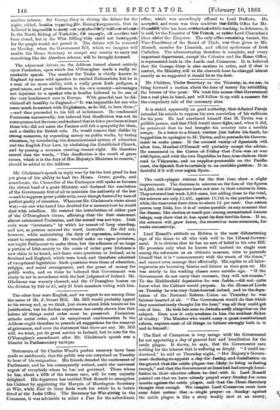Mr. Gladstone's speech in-reply was by far-the best proof he
has yet given of his ability to lead the House. Grave, gentle, and considerate, the Chancellor of the Exchequer still spoke as became the virtual head of a great Ministry, and declared the resolution of 'the Government first of all to-maintain the authority of the law —and to suppress-greatpublicevilse even though fostered•by men of perfeect purity of intention. Whatever leIreGlachitone's views about vtar,—no one who heard him doubted-for a moment-haw he.would deal-with rebellion. He resisted the introduction of either 'part of the O'Donoghue's clause; affirming= that the first statement almast extenuated- Fenianism, andthe second was not true.. Irish evil§ were "inveterate," by -which he :meante of long standing? and not, as persons misread the word; incurable. He- did not; however, while maintaining the ditty of- repression, advocate a resort to repression alone. H' would -make no vague. promises,- noroughtlettliamenteto make them, but the adhesion of so: large a portion of Irish society-to the cause-of order- gave Irishmen .a new. claim to be heard, and there were questions- in Ireland, asin Seotland and England; which-were local, and therefore admitted of exceptionallegislation. Sach questions were those of education, religion, and social arrangement, and the grant of money for public works, and on these he believed that Government was ready to act in accordance with the best judgment of Ireland. Mr, Gladstone was warmly cheered, and the O'Donoghue beaten on the division by 346 to-25, only 21 Irish members voting with him.






























 Previous page
Previous page